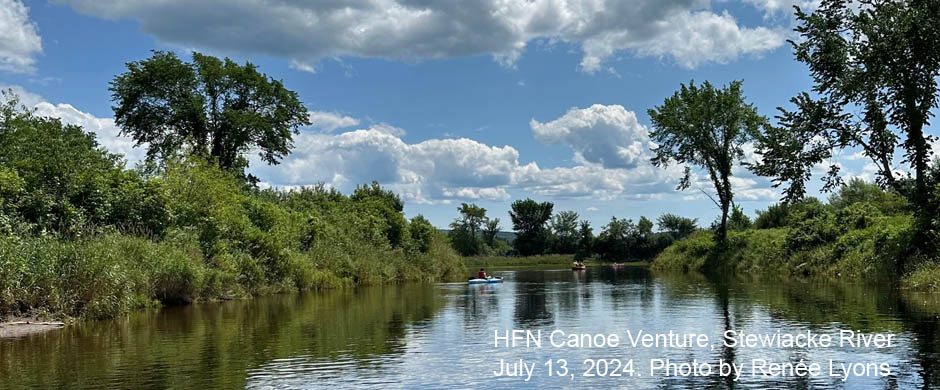A TRIBUTE TO COLIN STEWART
Reproduced from the Halifax Field Naturalist, Issue 115 (June to August 2004)
On March 15, 2004, Nova Scotia lost a champion for nature conservation when Colin Stewart passed away, less than one year after having been diagnosed with pancreatic cancer. He was 50.
Born in Ottawa and raised in Toronto and Winnipeg, Colin and his parents moved to Halifax when he was still a teenager. After graduating from Dalhousie University with an Honours B.Sc. degree in Biology with a focus on ecology, he worked with Fisheries Research in St. Andrews, N.B. before pursuing a career in environmental research and consulting.
Colin was best known for his service as Nova Scotia Coordinator for the World Wildlife Fund’s Endangered Spaces Campaign. During his tenure,Colin was instrumental in the securement of 31 Protected Wilderness Areas encompassing over 287,000 hectares and representing many Nova Scotian ecosystems. He worked tirelessly and passionately towards this goal, lobbying politicians and bureaucrats for the protection of these special areas.
Many of Colin’s accomplishments came about through his passion and respect for nature and his love of the outdoors. His recreational activities included hiking, cycling, canoeing, and cross-country skiing. Colin and his wife Betty loved to travel, often back-packing and camping in remote locations in Canada, the U.S., and overseas, then sharing these memories with friends and fellow naturalists.
Colin spearheaded the establishment of the Piping Plover Guardian Program in Atlantic Canada; chaired the ‘Trails for Tomorrow’ conference which gave birth to the Nova Scotia Trails Federation; and also played a lead role in the formation of the Federation of Nova Scotia Naturalists, the Nova Scotia Nature Trust (a land trust), and the Atlantic Chapter for CPAWS. Colin had a special gift for bringing diverse interests together to work for common goals. His was the clear voice for the protection of natural areas, and he was able to communicate this effectively to others who had differing points-of-view through a dialogue of mutual respect and trust. sought solutions based on science and truth, not confrontation.
As president of the Friends of Hemlock Ravine, Colin negotiated with the developer of an adjoining sub-division to avoid altering drainage patterns into the ravine. During the process, he was able to secure an additional piece of woodland!Colin also worked on management plans for several other HRM parks including Long Lake Provincial Park, McNabs and Lawlors Islands, and Point Pleasant Park.
In a chapter of the book Protecting Canada’s Endangered Spaces, Colin wrote: “As a consequence of the fisheries’ collapse, those of us living on the shore of ‘the sea without fish’ now appreciate the need to help the ocean replenish itself. Have we learned the same lesson for the land?” In November 2003, Monte Hummel, president of Wo rld Wildlife Fund Canada and long-time friend and colleague of Colin, was the keynote speaker at the Nova Scotia Nature Trust annual dinner. They had walked together earlier on that day, examining the hurricane damage at Point Pleasant Park. Later, at the Trust’s dinner, Monte recalled, “There was a touching slide presentation, and in the reflected light I saw Colin leaning against the wall watching the fabulous images of Nova Scotia wilderness. I felt very privileged and honoured to be in that room at that moment.”
Colin received a number of honours and awards over the past year – the prestigious Douglas H. Pimlott Conservation Award from the Canadian Nature Federation, the Colin Stewart Award for Conservation in Nova Scotia (created by the Halifax Field Naturalists to commemorate his 20+ years of conservation work on behalf of HFN and the province), and other special awards from the Eastern Canada Piping Plover Recovery Team and the Friends of McNabs Island.
Long-time friend and fellow conservationist Raymond Plourde, Wilderness Coordinator for the Halifax-based Ecology Action Centre, noted, ” Nova Scotia has lost a giant in conservation…but we certainly haven’t lost the evidence of what he did.” Even though severely weakened by his illness, Colin continued to work on what was to be his last major challenge – the remediation and restoration of hurricane Juan-devastated Point Pleasant Park.
– Bob McDonald
